Business
FG To Stabilise Price Of Rice By April

L-R: Permanent Secretary, Ministry of Agriculture and Rural Development, Dr Shehu Ahmed; Minister of State for
Agriculture and Rural Development, Sen Heineken Lokpobiri; Minister of Agriculture and Rural Development, Chief Audu Ogbeh and President, International Fund for Agricultural Development, (IFAD), Mr Kanayo Nwanze at the Regional Implementation Forum for IFAD supported projects in Abuja on Tuesday.
The Federal Govern
ment said on Saturday that it would stabilise the price of rice from April to make it affordable to everybody in the country.
The Minister of Agriculture and Rural Development, Chief Audu Ogbeh, made this known while declaring open the 2016 National wheat farmers field day in Alkamawa village in Bunkure Local Government of Kano state.
Ogbeh said that the stability of price of rice would be very viable due to its demand and affordability to the people from April.
He said the boosting of wheat production and other cereals had become necessary to reduce over dependence on importation.
The minister added that over 300, 000 hectares of land in wheat producing states would be dedicated to boost wheat production.
“The government will continue to support farmers to encourage agricultural activity, enhance food security and employment generation in the country,’’ he said.
According to him, the administration of President Muhammadu Buhari will diversify the economy with greater emphasis on agriculture.
Ogbeh urged Nigerians to embrace agriculture to enhance their welfare and enable them become self reliant.
In a remark, Chairman Senate Committee on Agriculture, Senator Abdullahi Adamu, said the senate would make legislation to remove obstacles being faced by wheat farmers in the country.
On his part, the Gov. Atiku Bagudu of Kebbi said Kebbi would dedicate 70 per cent of the proposed 300, 000 for wheat production to boost its production.
Transport
Automated Points Concession : FAAN Workers Gave 72hrs To Revise Decisions In PH

Transport
FAAN Announces Pick-Up Points for Go-Cashless Cards

Business
Fidelity Bank To Empower Women With Sustainable Entrepreneurship Skills, HAP2.0
-

 News4 days ago
News4 days agoAmend Constitution To Accommodate State Police, Tinubu Tells Senators
-

 Politics4 days ago
Politics4 days agoSenate Urges Tinubu To Sack CAC Boss
-
Business5 days ago
Crisis Response: EU-project Delivers New Vet. Clinic To Katsina Govt.
-
Business5 days ago
President Tinubu Approves Extension Ban On Raw Shea Nut Export
-

 News4 days ago
News4 days agoDisu Takes Over As New IGP …Declares Total War On Corruption, Impunity
-
Business5 days ago
Fidelity Bank To Empower Women With Sustainable Entrepreneurship Skills, HAP2.0
-
Business5 days ago
President Tinubu Extends Raw Shea Nuts Export Ban To 2027
-
Sports5 days ago
NDG: Rivers Coach Appeal To NDDC In Talent Discovery

